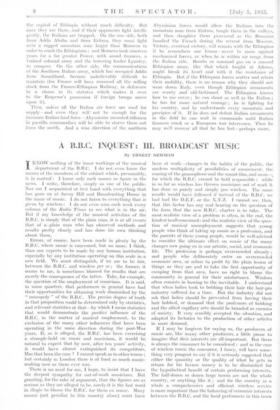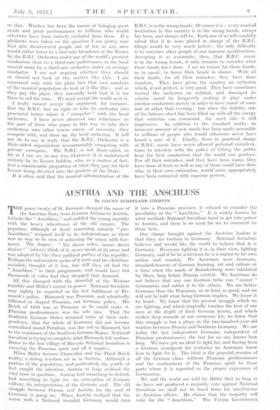A B.B.C. INQUEST : III. BROADCAST MUSIC
By ERNEST NEWMAN
IKNOW nothing of the inner workings of the musical department of the B.B.C. I do not even know the names of the members of the cabinet which, presumably, is in control : I know only such names as figure in the news. I write, therefore, simply as one of the public. Nor am I acquainted at first hand with everything that has gone on at Savoy Hill and Broadcasting House in the name of music. I do not listen to everything that is given by wireless : I do not even scan each week every column of the Radio Times to see what is in the air. But if my . knowledge of the musical activities of the B.B.C. is simply that of the plain man, it is at all events that of a . plain man who has observed methods and results pretty closely and has done his own thinking about them.
Errors, of course, have been made in plenty by the B.B.C. where music is concerned, but no more, I think, than one expects to be made by any human institution, especially by any institution operating on this scale in a new field. We must distinguish, if we are to be fair, between the B.B.C. and wireless per se ; the former, it seems to me, is sometimes blamed for results that are merely the consequence of the latter. Take, for example, the question of the employment of musicians. It is said, in some quarters, that performers in general have had their opportunities for obtaining work diminished by the " monopoly " of the B.B.C. The precise degree of truth in that proposition could be determined only by statistics, and relevant statistics at that—by which I mean statistics that would demonstrate the positive influence of the B.B.C. in the matter of musical employment, to the exclusion of the many other influences that have been operating in the same direction during the post-War years. If, as is alleged, the B.B.C. has been exercising a strangle-hold on music and musicians, it would be natural to expect that by now, after ten years' activity, it would have almost extinguished its competitors. Has that been the case ? I cannot speak as to other towns ; but certainly in London there is at least as much music- making now as there ever was.
There is no need for me, I hope, to insist that I have the deepest sympathy for out-of-work musicians. But granting, for the sake of argument, that the figures are as serious as they are alleged to be, surely it.is the last word in illogic to blame the B.B.C. for them en masse. Many causes (not peculiar to this country alone) must have been at work—changes in the habits of the public, the modern multiplicity of possibilities of amusement, the coming of the gramophone and the sound-film, and so on— for which the B.B.C. cannot be held responsible : while in so far as wireless has thrown musicians out of work it has done so purely and simply qua wireless. The same results would have .followed if instead of the B.B.C. we had had the D.E.F. or the X.Y.Z. I cannot see, then, that this factor has any real bearing on the question of the form that the new B.B.C. charter is to take. The most realistic view of a problem is often, in the end, the kindest to all concerned : and the realistic view of the ques- tion of musical unemployment suggests that young people who think of taking up music as a profession, and the parents of these young people, would be well-advised to consider the ultimate effect on music of the many changes now going on in our artistic, social, and economic life. The profeSsion is perhaps overcrowded already ; and people who deliberately enter an overcrowded economic area, or refuse to profit by the plain lesson of things as they are and to take the first opportunity of escaping from that area, have no right to blame the community in general for their misfortunes. Wisdom often consists in bowing to the inevitable. I understand that when ladies took to bobbing their hair the hair-pin industry suffered for a time. But the industry did not ask that ladies should be prevented from having their hair bobbed, or demand that the professors of bobbing and the allied capillary arts should be branded as enemies of society. It very sensibly accepted the situation, and adapted its factories to the produCtion of other articles in more demand.
If I may be forgiVen for saying so, the producers of music are, like many other producers, a little prone to imagine that their interests are all-important. But there is always the consumer to be considered : and in the case of wireless music the consumer, I fancy, will. have some- thing very pungent to say if it is seriously suggested that either the quantity or the quality of what he gets in return for his licence money is to be diminished for the hypothetical benefit of certain performing interests. The half-dozen or dozen large towns are not the whole country, or anything like it : and for the country as a whole a comprehensive and efficient wireless service is more important than the balancing of economic interests between the B.B.C. and the local performers in this town or that. Wireless has been the means of bringing great music and great performances to millions who would otherwise have been entirely excluded from them. , If a plebiscite were taken on the question I am pretty sure that nine disinterested people out of ten in any area would rather listen to a first-rate broadcast of the Eroira by the B.B.C. Orchestra under one of the world's greatest conductors than to a third-rate performance in the local concert room by a third-rate orchestra under an average conductor. I am not arguing whether they should or should not look at the matter like this. I am concerned only with the plain fact that vast numbers of the musical population do look at it like this ; and•as they pay the piper, they naturally hold that it is for them to call the tune. We must accept the world as it is.
I really cannot accept the argument, for instance, that the B.B.C. has no right to take its orchestra into provincial towns where it " competes " with the local orchestra. I have never observed any reluctance on the part of those who argue in this way to take their orchestras into other towns where, of necessity, they compete with, and show up, the local orchestra. It will not do to say in reply that the B.B.C. Orchestra is a State-aided organization unwarrantably corepeting with private enterprise. The B.B.C. is not State-aided, as far as I can see, in any way whatever : it is maintained entirely by its licence holders, who, as a matter of fact, find a considerable proportion of what they pay for their Licence being diverted into the pockets of the State. It is often said that the musical administration of the Bile. is in the wrong hands. Of course it is : every musical institution in this country is in the wrong hands, always has been, and always will be. Each one of us will candidly admit that if he were placed in charge of the B.B.C. things would be very much better : , the only difficulty is to convince other people of our superior qualifications. Accepting it as axiomatic, then, that B.B.C. music is in the wrong hands, it only remains to consider what these hands have done. I see no reason for those hands, so to speak, to lower their heads in shame. With all their faults, for all their mistakes, they have done wonders. not have giyen the country an orchestra which, if not perfect, is very good. They have sometimes wasted the orchestra on rubbish, and damaged its artistic moral by frequently making it play under inferior conductors merely in order to have music of some sort or other that evening : but when the liability side of the balance-sheet has been filled up with all the energy that criticism can command, the asset side is still impressive. In addition to the standard works, an immense amount of new music has been made accessible to millions of people who would otherwise never have heard a note of it. Finally, those in practical charge of B.B.C. music have never allowed personal considera- tions to interfere with the policy of letting the public hear the best conductors that the world can produce. For all their mistakes, and they have been many, they have done at least as well as any of those could have done who, in their own estimation, would more appropriately , have been entrusted with supreme powers.















































 Previous page
Previous page